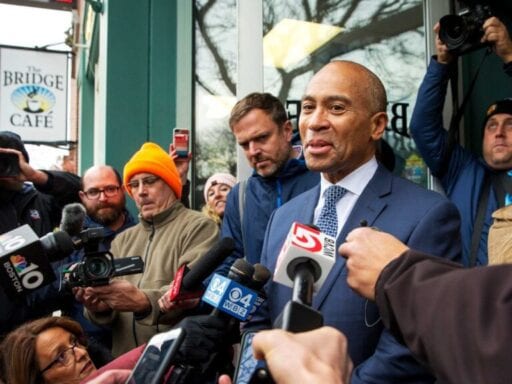Patrick was a late entry to the presidential race — now, he’s making an early exit.
Former Massachusetts Gov. Deval Patrick has dropped out of the Democratic presidential race after failing to claim even 1 percent in the New Hampshire primary.
Patrick was a late entry to an already-crowded field, and he struggled to gain traction for his candidacy. He never topped 1 percent in FiveThirtyEight’s national polling average, and in South Carolina, according to FiveThirtyEight, he was polling at one-tenth of a percent before ending his campaign.
A moderate, Patrick emphasized his extensive experience in government, as the two-term governor of Massachusetts, and in business, including with the private equity firm Bain Capital. He presented himself as an alternative to fellow candidates former Vice President Joe Biden, former South Bend, Indiana, Mayor Pete Buttigieg, and Minnesota Sen. Amy Klobuchar, but found little room to run in a crowded moderate lane.
Patrick also hoped his biography would distinguish him from the rest of the field. The former governor grew up in a low-income household on the South Side of Chicago and was the first in his family to attend college; he eventually earned a law degree from Harvard University.
Patrick announced that he was suspending his campaign in a statement to supporters Wednesday morning.
He said that his disappointing finish in New Hampshire was “not enough for us to create the practical wind at the campaign’s back to go on to the next round of voting.”
Patrick was once seen as a strong candidate but entered the race too late
Patrick considered entering the race as far back as August 2017; then, Edward-Isaac Dovere of Politico reported that “Barack Obama is nudging him to run” and referred to Patrick as “Obama world’s clear and away 2020 favorite.” However, his wife’s cancer diagnosis, among other factors, derailed any plans he might have had for an early entry into the race.
“I planned on announcing a year ago,” Patrick said in a recent campaign video, “but life had other ideas.”
It took him until November 14, 2019 — less than three months from the Iowa caucuses — to finally announce his candidacy.
Now cancer-free, Diane Patrick says she urged her husband to jump into the race. Because of his late entry, his campaign focused much of its energy on New Hampshire — which neighbors Patrick’s adopted home state of Massachusetts — and on South Carolina, rather than going all-in on Iowa like many of his rivals.
Patrick’s entry into the race may have been in part precipitated by concerns from the Democratic donor class: Politico reported in early November, days before Patrick announced, that “top Democratic donors became increasingly concerned with the field,” and particularly with Biden’s capacity to serve as the party’s moderate standard-bearer.
Nonetheless, many in the Democratic Party worried — perhaps rightly, following Patrick’s early exit from the race — that it was simply too late for a new face to join the field.
“I think Deval Patrick makes an excellent candidate,” South Carolina state Sen. Marlon Kimpson told the New York Times in November. “However, I am very, very concerned that he simply will not have enough time to make the case in the state of South Carolina.”
According to Patrick’s campaign manager Abe Rakov, Patrick hoped to overperform expectations in New Hampshire to gain momentum before the South Carolina primary later in the month; that momentum, however, never appeared.
An uncertain future
Patrick’s political future is unclear. Before entering the race, he was a managing director at Bain Capital. Now, though his candidacy never took off, his name could be in contention for vice president or for a Cabinet position.
The former Massachusetts governor hasn’t shown a strong affinity for the campaign trail, however, citing the “cruelty of our elections process” in his original decision not to enter the race, and he stepped away from politics for the better part of five years after his second term as governor — the only elected office he’s held — concluded in 2015.
“I believe that America is yearning for two things,” Patrick said in a statement announcing the end of his campaign. “Better outcomes and a better way.” But that belief wasn’t enough for him to catch on.
Patrick follows entrepreneur Andrew Yang and Colorado Sen. Michael Bennet out of the race, both of whom suspended their campaigns Tuesday night. His departure leaves eight candidates in contention for the Democratic nomination for president.
Author: Cameron Peters
Read More



